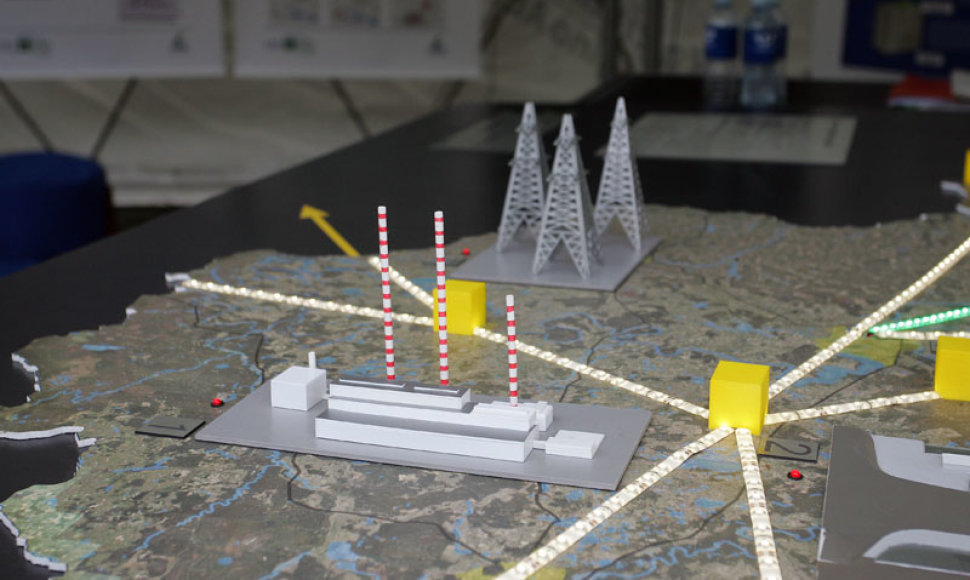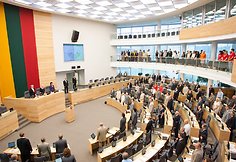The Seimas (parliament), which convened for an extraordinary session on Monday, passed a respective decision in a vote of 62 to 39 with 18 abstentions.
The initiative to call the referendum was put forward by the Christian parliamentary group. It will be an advisory referendum and its results will not be binding for the government.
The voters will have to vote ‘yes’ or ‘no’ on the following statement: “I support the construction of a new nuclear power plant in the Republic of Lithuania”.
Prime Minister Andrius Kubilius pointed out that Seimas’ decision to hold the referendum, which, in his opinion, is not necessary, simultaneously with the general elections “would make energy independence the key topic in the election campaign”. He admitted that such a topic was not unwelcome.
In Kubilius’ view, the organizers of the referendum were engaging in politicizing.
“I have said repeatedly that I see more politicizing in the initiative and I want to note once again that the initiative is launched by parties and individual parliamentarians of the mixed group who do not stand good chances during the election," he told reporters in the Seimas.
He expressed belief that voters would not get lured by such initiatives. „People have proved many times that they are cleverer and wiser than politicizing politicians.”
Kubilius would not comment how parliament's decision on the referendum might affect talks with the regional partners and the strategic investor.
Before this, the Seimas had turned down – in a vote of 52 to 41 with 24 abstentions – a proposal from the Liberal Centrist MPs to hold a referendum after the completion of talks with Japan’s Hitachi, a strategic investor in the nuclear facility, and regional partners.
Julius Veselka of the Order and Justice Party projected that the voters’ decision on the nuclear facility would not be decisive. If they voted for the facility but the Latvians and the Estonians decided against joining the project, the nuclear power plant would not be built, he explained.
Birutė Vėsaitė of the Social Democratic Party urged to “mobilize the society for the renovation of blocks of flats instead of discussions about the new nuclear power plant”.
Lithuanian President Dalia Grybauskaite says the Seimas' decision to hold an advisory referendum on the construction of a new nuclear power plant along with the upcoming Seimas elections is another opportunity and obligation for the government to better introduce the public to this project.
"The president believes that it’s another opportunity and obligation for the government to make an in-depth presentation of the project to the public," the Press Service of the President told BNS on Monday.
The Seimas has already given the go-ahead for the construction of the new facility but the final investments decisions will be taken by the end of 2015.
Lithuania expects to build a new nuclear power facility in Visaginas by 2020. The government plans that the facility’s construction will be launched in 2014 and it could start generating electricity in 2020.
In line with existing plans, Hitachi, the strategic investor, would own 20 percent of shares in the Visaginas plant and Lithuania would hold 38 percent. Latvia and Estonia would take stakes of 20 percent and 22 percent, respectively. The ownership stakes could change if Poland joined the project.
Back in 2005, the parliament passed a resolution, stating that Lithuania should remain a nuclear state and continue producing electricity in a nuclear power plant, also expressing the parliament's legal and political support to investments in construction of a new reactor.
Talks with investors will not be affected
A decision by Lithuania’s parliament to hold an advisory referendum on the construction of a new nuclear power plant will not affect talks with the regional partners and Japan’s Hitachi, according to some officials.
“Talks with the regional partners are continued in parallel to political processes. Seimas’ decision provides a possibility and imposes a certain obligation to use all possible means and channels to provide the public with as much information as possible about the advantages of a project of Visaginas nuclear power plant and its benefits for Lithuania,” Energy Minister Arvydas Sekmokas told BNS via a spokesman.
“We continue to do the same work that we have been doing so far, including our work with the regional partners, and our work with the strategic investor. All tasks remain unchanged. I do not think that this decision would change anything in talks... Now, with such a decision passed by the Seimas, we will seek to spend more time on raising the society’s awareness about this project,” Rimantas Vaitkus, CEO of Visagino Atominė Elektrinė (Visaginas Nuclear Power Plant), the company charged with preparatory arrangements for the new nuclear facility project, told BNS.


















